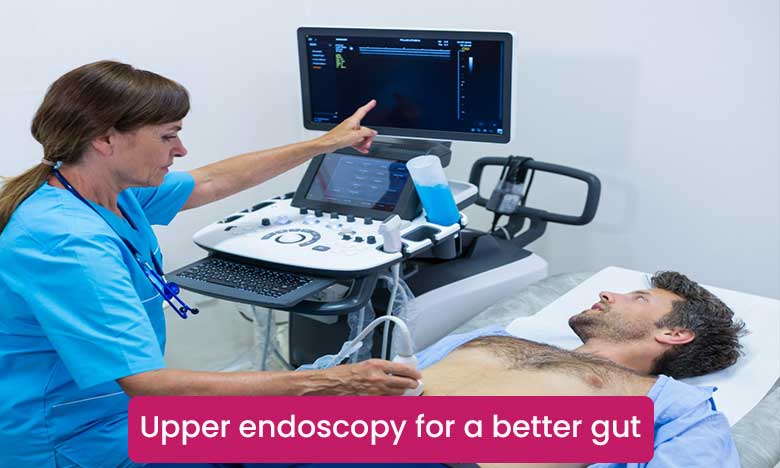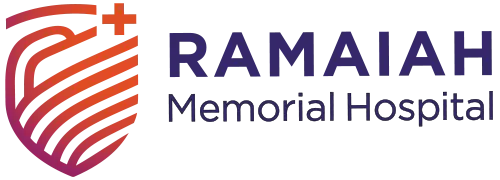Upper Endoscopy For A Better Gut

What is an Endoscopy?
Endoscopy is a non-surgical procedure that enables visual examination of the digestive tract of the patient. Your doctor can view a magnified video capture of the digestive tract on a display monitor using an endoscope, a flexible tube equipped with a light source and a camera.
An endoscope is introduced with care through the mouth and neck and into the oesophagus during an upper endoscopy, allowing the doctor to examine the oesophagus, stomach, and upper part of the small intestine.
Upper endoscopy
As mentioned earlier, Upper endoscopy is a procedure that is used to diagnose and, in some cases, cure disorders that affect the upper part of the digestive system, such as the oesophagus, stomach, and small intestine (duodenum).
Why do you need an upper endoscopy?
An upper endoscopy can help with the following:
- Diagnose conditions like ulcers, gastritis and gastro-esophageal reflux which will have characteristic signs during endoscopy. In addition it can visualize any mass lesions in the upper GI tract which can suggest cancer.
- Take biopsy of any suspicious areas of the upper GI tract to obtain definitive diagnosis and plan management
- Therapeutic options: Upper endoscopy is a versatile modality that has an important therapeutic potential and can be used to arrest bleeding from vessels, remove small mass lesions that are early cancers and dilate/widen areas of the GI tract that are narrowed due to disease. In addition, metal tubes called stents can be placed at areas of narrowing to help widen the tract and prevent obstruction.
Endoscopies are frequently combined with other procedures, such as ultrasound scan, CT scan abdomen, etc. to get more information on the disease and plan management.
In addition, special cases may require the use of Endoscopic Ultrasound (EUS) which is a specialized upper endoscope that can perform an ultrasound scan from inside the GI tract. This is useful to visualize the biliary tract and pancreas.
How to prepare for an Upper Endoscopy?
Preparation of the gut by fasting for 6-8 hours before the procedure is all that is required to examine the upper digestive tract (upper endoscopy or ERCP).
A sedative can be given for endoscopic exams. This type of sedation is called conscious sedation that only blunts your consciousness mildly and creates a relaxed atmosphere during the procedure. These medications are injected into the bloodstream with IV access, a few minutes before the procedure. The effects will last for 45 minutes to 1 hour depending on the dosage used and the patient build.
Risks of Upper Endoscopy
Overall, upper endoscopy is a highly safe modality. However, there are potential issues that can rarely arise during the procedure:
- Perforation – Very rare, usually seen in GI tracts that are diseased/surgically altered. It refers to a tear/defect in the GI tract secondary to scope instrumentation
- Side effects of sedation – Cardio-respiratory complications. This is why a thorough cardiac and respiratory evaluation is done prior to the procedure. It is generally a good idea to disclose all pre-existing medical conditions to your Gastroenterologist prior to the procedure
- Infection – Infection is an exceedingly rare complication that has been described. This is usually due to inadequate cleaning of the endoscope prior to the procedure. This is why endoscopy should be preferred in tertiary care centers which are accredited and follow validated standard precautions during the procedure.
Recovery period post an endoscopy
After an upper endoscopy, the patient will be monitored for 45 minutes if sedation was used.
Because of the sedative effect of the drug used to avoid the pain, the person should avoid operating heavy machinery or drive for the rest of the day. Any symptoms/ issues should be reported to a doctor as soon as possible so as to institute corrective measures and treat complications early.
There may be some discomfort in the throat lasting for a few hours. Bloating is also temporary and usually non-distressing.
At Ramaiah Memorial Hospital we are equipped to handle any gastro issues. Our team of experienced doctors will keep you comfortable and our care givers will nurse you back to health in a short period of time.
Dr. Harshavardhan Rao
Department of Gastroenterology

